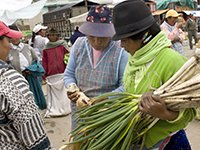Partly for reasons of cultural identity and partly because the state has proved unable to protect them against criminality, indigenous communities in Peru and Ecuador have maintained their traditional judicial systems. Though recognized constitutionally, these systems continue to be a source of legal and political contention. Considering both the major social significance of indigenous justice as a means of conflict-resolution and the ongoing controversy over its scope, information about current judicial practice in the communities in question is surprisingly scant. It is on this gap in research that PRIF Working Paper No. 37 "„Justice is achieved if peace is restored“. Indigenous Justice,Legal Pluralism, and Change in Peru and Ecuador" by Hans-Jürgen Brandt focuses, examining in particular: the principles and rules applied in indigenous justice; the relative frequencies of different types of conflict and conflict-resolution; the problems associated with this type of justice; the differences between the various legal cultures reviewed; and key trends and determinants of change. The study, of mixed-method design, reveals that indigenous justice is primarily consensus-oriented. Its chief objective is to restore communal peace and reintegrate offenders. The legal regulations and practices used to achieve these goals, however, are not static: the notion of autochthonous legal systems based on immutable ‘ancestral’ rules is a myth.
Contrary to what this common preconception would suggest, the study indicates that any traditional legal norms that run counter to the interests of the local community are modified by the introduction of new legal rules, many of which – such as the protection of women from gender-based violence – derive from state law. Among the factors which indigenous representatives interviewed for this study considered key in bringing about change was local NGO-led education and training – notably on human rights.
Download (pdf, 656kb): Brandt, Hans-Jürgen (2017): „Justice is achieved if peace is restored“. Indigenous Justice, Legal Pluralism, and Change in Peru and Ecuador, PRIF Working Papers No. 37, Frankfurt/M.
